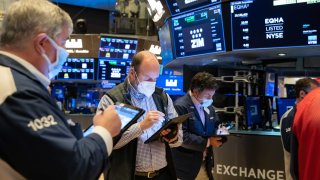
The Dow Jones Industrial Average ended another day near the flatline on Thursday as the market's strong momentum to begin February started to lose steam.
The blue-chip benchmark dipped just 7.1 points from a record high to 31,430.70. The S&P 500 gained 0.2% to eke out a record closing high of 3,916.38. The tech-heavy Nasdaq Composite gained 0.4% to 14,025.77, also a fresh record.
Energy was the worst-performing sector, sliding more than 1%, while the strength in technology supported the broader market.
After a strong runup in equities in the beginning of February, the market rally seemed to slow down a tad. The S&P 500 moved within 0.2% for three straight days this week. For this month so far, the broad equity benchmark has gained 5.4%.
"We pulled a lot of optimism forward, and the market is trying to figure out where we go from here," said Gregory Faranello, head of U.S. rates trading at AmeriVet Securities. "The fiscal and monetary side of the equation seems priced into the market. Going forward, we need to see a broader economic recovery, a broader reopening and a broader dissemination of the vaccine."
Investors also digested a worse-than-expected reading of weekly jobless claims. First-time claims for unemployment insurance totaled 793,000 last week even amid declining Covid-19 cases. Economists polled by Dow Jones expected a total of 760,000.
Money Report
The market rallied to record levels this month as investors anticipated that any additional fiscal relief measures would support equities further. The S&P 500 has gained 4.3% this year so far, while the Russell 2000 jumped more than 15% year to date as beaten-down small caps rotated into favor with rising reopening optimism.
"There are concerns that the combination of the reopening and possibly $1.5 trillion in stimulus in the pipeline could cause an overshooting, which would lead to higher long bond yields and higher interest rates," said Ross Mayfield, investment strategy analyst at Baird. "Then that becomes a headwind to the equity markets."
The federal budget deficit is projected to total $2.3 trillion in the 2021 fiscal year, a decline from last year but still well above anything the U.S. had seen prior to the Covid crisis, the Congressional Budget Office reported Thursday. The total also does not include the $1.9 trillion in relief spending that President Joe Biden has proposed.
Federal Reserve Chairman Jerome Powell said Wednesday that the economy faces challenges in the labor market, and so monetary policy needs to stay "patiently accommodative." In remarks at the Economic Club of New York, Powell said the employment picture is a "long way" from where it needs to be.
Subscribe to CNBC PRO for exclusive insights and analysis, and live business day programming from around the world.






